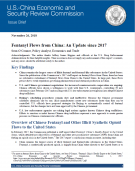Research
Research

The U.S.-China Economic and Security Review Commission invites submission of proposals to provide a one-time unclassified report on China’s smart cities development. Electronic or hard-copy proposals must be submitted by 5:00PM (EST) on February 20, 2019.
Research
China is the largest market for trafficked wildlife products. Its demand has been an important factor leading to declines in iconic species such as elephants and big cats, as well as in lesser-known species like pangolins. Although China’s legal regime establishes protections for many endangered species, loopholes regarding captive breeding and antitrafficking enforcement create opportunities for the illicit wildlife trade to flourish. Success in combating this trade varies by species: regarding the trade in elephant ivory, for example, a confluence of domestic and international pressure culminated in a U.S.-China joint ivory ban, completed in early 2018. Though indications following the ban appear promising, China’s recent partial reversal of its ban on the use of rhino horn and tiger bone highlights continuing shortcomings in its effort to combat wildlife trafficking.
Research

This issue brief provides an update to the Commission's February 2017 report on fentanyl flows from China, examining the progress of negotiations between U.S. and Chinese law enforcement authorities. Although the Chinese government has taken steps to reduce the manufacture and export of fentanyl-like substances, China remains the largest source of illicit fentanyl and fentanyl-like substances in the United States. To combat these flows, U.S. authorities have begun taking legal actions against known Chinese drug traffickers, including announcing the first ever indictments and sanctions against Chinese fentanyl traffickers.
